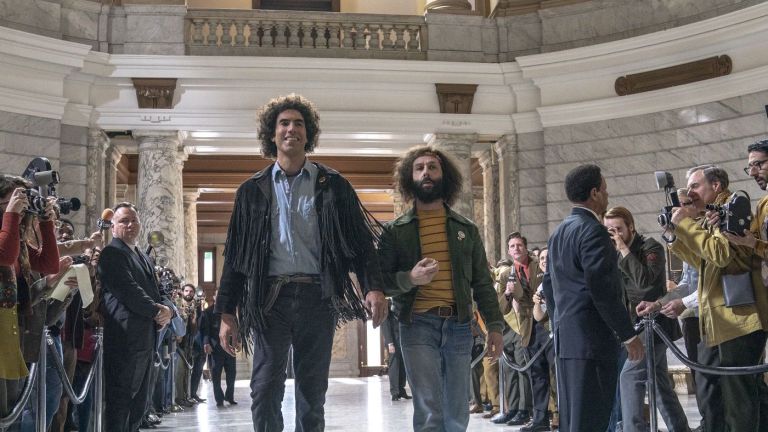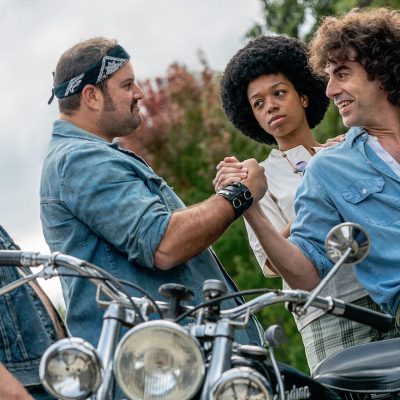The Trial of the Chicago 7 Review: The World is Still Watching 50 Years On
Aaron Sorkin directs one of the most thrilling movies of the year in The Trial of the Chicago 7, finding our current anxieties reflected 50 years on from the aftermath of a police riot in an election year.

People stand gathered around a federal building, outraged at the violent treatment of fellow peaceful demonstrators; counter-protestors are also standing by, waving signs which bemoan the lack of focus on all civil rights; and an exceedingly politicized Justice Department gathers trumped up charges intended to demonize those they deemed “radical,” “subversive,” and “the far left.” No this isn’t the nightly news, it’s the opening moments of Aaron Sorkin’s The Trial of the Chicago 7, a movie about a grotesque miscarriage of justice from 50 years ago.
Premiering on Netflix just before the U.S. presidential election, but months after a summer of civil unrest, The Trial of the Chicago 7 feels both tailored for our moment and almost transported from another universe. The irony of the timeliness is not lost on Sorkin, who filmed Chicago 7 a year before the death of George Floyd ignited a new wave of protests across the country (Sorkin also began writing the movie during the Bush administration). However, the picture is likewise rooted in Sorkin’s general optimism for a legal system that led him to pen some of the most sterling courtroom dramas of the last 30 years, including the heroic A Few Good Men. That optimism leads him still, causing him to frequently write about the renewal of the American experiment.
But perhaps more than any other film he’s authored to date, Chicago 7 is a Sorkin experiment. Here is a movie where the characters the writer-director clearly most identifies with are the ones late to the party in understanding they’re trapped in a sham political trial, and what’s at stake is every character’s (and presumably viewer’s) faith in the judicial system. In this way, it might be Sorkin’s most interrogative screenplay of the ideals he so reveres.
Centered around the infamous conspiracy trial of the “Chicago Eight” (soon reduced to “Seven”), the film is essentially Sorkin using a singular intimate event to explore the social unrest of the 1960s—and, whether by accident or design, also today. Prior to the movie’s 1969 trial, the Democratic National Convention of 1968 devolved into a riot outside the Conrad Hilton Hotel in Chicago. A multitude of factors contributed to this, but at its root Mayor Richard Daley’s government refused to provide permits for the more than 10,000 anti-Vietnam War protestors who gathered in the city to vocally reject the war escalated by the Democratic Party’s current president. Daley did, however, call in more than 23,000 state and city police officers, and Illinois National Guardsmen.
President Lyndon B. Johnson’s own administration would ultimately define what followed as a “police riot,” where law enforcement provoked the violence of the night and began indiscriminately beating protestors, journalists, and almost any passerby on the streets. Nonetheless, the film opens with young federal prosecutor Richard Schultz (Joseph Gordon-Levitt) being given an uneasy task by the new Nixon administration to charge eight leaders of various political factions with conspiracy to incite a riot across state lines. This prosecution is all the more difficult since many of the accused have never met. Hell, Black Panther Party co-founder Bobby Seale (Yahya Abdul-Mateen II) was only in Chicago for four hours, flying in to give a speech and then returning home to Oakland well before the violence erupted.
And yet, sure enough, a motley crew of supposed political subversives are rounded up to make an example of “the far left.” In addition to Seale, they include Tom Hayden (Eddie Redmayne), a leader of the Students for a Democratic Society, Abbie Hoffman and Jerry Rubin (Sacha Baron Cohen and Jeremy Strong), leaders of the Youth International Party (Yippies), and David Dellinger (John Carroll Lynch), the conscientious objector leader of the Mobilization to End the War in Vietnam (the Mobe). There are also two random kids thrown in so the jury can feel guilt-free about absolving two protestors while condemning the other six. Because rest assured that’s the expected outcome despite the protests of liberal lawyer William Kunstler (Mark Rylance). The legal counsel of the seven white defendants may believe the system is impartial, but he hasn’t yet met Judge Julius Hoffman (Frank Langella), who makes his biases plain the moment he refuses to hear Seale’s demands to have his own lawyer present.
Sorkin is a writer so distinct that his last name has become an adjective for a singular form of brisk dialogue. But while his penchant for “Sorkinese” language is abundantly familiar, The Trial of the Chicago 7 is only his second feature as a director. And like Molly’s Game before it, Chicago 7 hints at a visual storyteller every bit as blistering as his rapid-fire dialogue. Seemingly looking to turn his features into full-length versions of what David Fincher achieved in the Harvard-Yale boat race in The Social Network, Sorkin’s direction pulsates with a breathless pace and tactically precise editing by Alan Baumgarten.
Despite being set mostly in a courtroom or the law offices orbiting it, the movie’s often thrilling use of linguistic momentum, with the cuts hanging by their fingernails to the characters’ words, is what keeps The Trial of the Chicago 7 from feeling stagey or like a play. Well that and flashbacks to the actual riots, which are appropriately chilling as actual footage of the carnage is interspersed with smash cuts of Sorkin’s recreations. A black and white wide shot of tear gas in the park gets juxtaposed with an extreme close-up of a baton smashing in the face of a girl in pigtails.
Additionally, the energy is quickened by Sorkin’s deep bench of acting talent. While every actor stands out, including Michael Keaton in a short, pivotal cameo, the film truly belongs to the performers that are the most antagonistic. Baron Cohen has made a career of confrontational, and often uncomfortable, comedy. So he’s a natural fit for the type of big-haired political dissident who thinks being on trial for dubious charges is the spotlight he’s always craved. Yet that perfect casting almost pales alongside the fireworks discharged by Abdul-Mateen and Rylance’s independent sparring matches with Langella.
A perfect personification of how even the American justice system can turn into a kangaroo court, Langella plays the villain of the piece with an aloofness which suggests he lacks the mental acuity to realize his hypocrisies. Oozing condescension, he patronizes Seale like a 19th century plantation owner who is flummoxed to hear complaints from the slave quarters. And that subtext becomes text in the movie’s most harrowing and heinous moment, one steeped in the cold facts of the trial. Abdul-Mateen’s waning patience with having to jump through the judge’s chained hoops is only matched by Rylance’s dawning despair at the crookedness of the situation.
Yet that might be The Trial of the Chicago 7’s one substantial stumble: The film and its storyteller is obviously more comfortable in the shoes of Rylance’s lawyer than most of the defendants in its title. While Sorkin gives plenty of floor space for Abdul-Mateen, Baron Cohen, and Strong, to embody political perspectives that are far more cynical and extreme than the American mainstream, the movie they’re in cannot help but look at them with the incredulous disbelief of Kunstler or from Hayden’s relatively more centrist vantage points.
These shortcomings manifest in an ending that feels a little pat, attempting to squeeze the ugly reality of the situation into a neat finale akin to, well, the type of 1990s Hollywood legal dramas that Sorkin cut his teeth on. These concessions to Sorkin’s impulses prevent Chicago 7 from being quite the masterpiece it almost is. Yet they don’t seriously detract from what is one of the most thrilling and propulsive movies of the year—one where a little Sorkinese fairy dust might be necessary given the perfect moment the film finds itself in. For here is a film that looks back with a weary sense of optimism at a moment of American darkness, while premiering in the grim days before November’s abyss.
The Trial of the Chicago 7 opens on Friday, Oct. 16.


